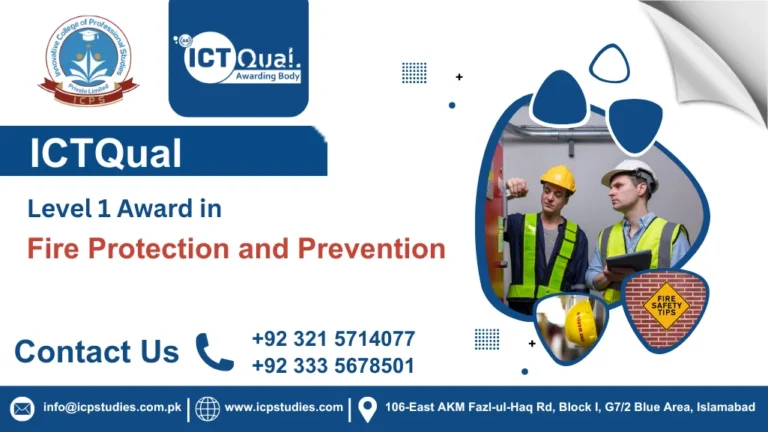The ICTQual Level 6 Diploma in Civil Engineering (360 Credits) is a comprehensive, three-year program designed for individuals aiming to pursue advanced knowledge and practical skills in the field of civil engineering. This qualification equips students with a deep understanding of engineering principles, construction practices, project management, and sustainable infrastructure solutions. Whether you are looking to progress your career in civil engineering or move into senior roles within the industry, this qualification is the key to unlocking your potential.
The ICTQual Level 6 Diploma in Civil Engineering (360 Credits) is a comprehensive, three-year program designed for individuals aiming to pursue advanced knowledge and practical skills in the field of civil engineering. This qualification equips students with a deep understanding of engineering principles, construction practices, project management, and sustainable infrastructure solutions. Whether you are looking to progress your career in civil engineering or move into senior roles within the industry, this qualification is the key to unlocking your potential.
The ICTQual Level 6 Diploma in Civil Engineering offers a comprehensive curriculum that blends technical expertise with practical application. Whether you aim to design robust infrastructure, lead major engineering projects, or specialize in a niche area like sustainable construction or BIM, this program equips you with the necessary skills to succeed in the dynamic field of civil engineering.
All About ICTQual Level 6 Diploma in Civil Engineering 360 Credits – Three Years
Course Overview
The ICTQual Level 6 Diploma in Civil Engineering (360 Credits) is an advanced three-year qualification designed to provide in-depth knowledge and practical skills required to excel in the civil engineering sector. This comprehensive program is tailored for individuals who wish to specialize in the design, management, and execution of large-scale engineering projects, and it is ideal for those looking to pursue leadership or senior roles in civil engineering.
Throughout the course, students will acquire a strong understanding of essential engineering principles, advanced construction methods, and sustainable practices. From structural design and project management to geotechnical and environmental engineering, this diploma prepares graduates to solve complex engineering challenges while meeting industry standards and adhering to regulations.
The course incorporates a blend of theoretical learning and hands-on practical experience, utilizing cutting-edge technology such as Building Information Modeling (BIM), hydraulic modeling, and advanced project management software. Upon completion, students will be equipped to manage diverse civil engineering projects, ensuring safety, cost-efficiency, and environmental sustainability.
Whether you are looking to progress your career in civil engineering or aiming to take on more senior roles in the industry, the ICTQual Level 6 Diploma in Civil Engineering offers the perfect foundation to achieve your goals.
Study Units
- Year 1:
- Engineering Mathematics
- Construction Technology
- Structural Mechanics
- Building Materials
- Surveying and Levelling
- Engineering Design Principles
- Geotechnical Engineering
- Hydraulics and Fluid Mechanics
- Health, Safety, and Welfare in Construction
- Construction Project Management
- Environmental Engineering
- Introduction to Structural Analysis
- Year 2:
- Advanced Engineering Mathematics
- Structural Steel Design
- Concrete Technology
- Geotechnical Design
- Transportation Engineering
- Advanced Surveying Techniques
- Sustainable Building Design
- Advanced Construction Management
- Hydraulic Engineering and Systems
- Structural Design and Analysis
- Site Investigation and Testing
- Research and Development in Civil Engineering
To enroll in the ICTQual Level 4 Diploma in Civil Engineering (120 Credits – One Year), candidates are generally required to meet the following entry requirements:
- Educational Qualifications:
- A minimum of Level 3 qualification (such as A-levels, vocational qualifications, or equivalent) in a related subject, such as mathematics, physics, or engineering, is typically required.
- Alternatively, candidates with a Level 2 qualification and relevant practical experience in the construction or engineering industry may also be considered for entry, subject to assessment.
- Mathematics and English Proficiency:
- A solid understanding of mathematics (particularly in algebra, geometry, and basic calculus) is crucial for success in the course, especially in areas like structural analysis and engineering calculations.
- English language proficiency at an appropriate level (e.g., GCSE grade C/4 or equivalent) is required, as the course involves reading technical documents, writing reports, and communicating engineering concepts clearly.
- Relevant Work Experience (Optional but Beneficial):
- While not mandatory, any previous work experience in construction, engineering, or a related field will be beneficial, as it will help in understanding the practical aspects of civil engineering concepts.
- Personal Commitment and Interest:
- A keen interest in civil engineering and construction, along with a strong commitment to learning, is essential for success in this program. As the course involves both theoretical learning and practical application, students must be prepared to dedicate time and effort to both areas.
If you meet these basic entry requirements or have a strong passion for civil engineering, the ICTQual Level 4 Diploma offers a great opportunity to build a strong foundation in this exciting and dynamic field.
The ICTQual Level 4 Diploma in Civil Engineering (120 Credits – One Year) is ideal for individuals who are looking to start or progress their career in the civil engineering field. This course is designed for:
1. Aspiring Civil Engineers
- If you are passionate about civil engineering and want to build a career in designing, constructing, and maintaining infrastructure, this course provides the foundational knowledge and practical skills to get you started.
2. Construction Professionals Seeking to Formalize Their Skills
- If you’re already working in the construction industry and wish to formalize your skills, gain a deeper understanding of civil engineering principles, and improve your job prospects, this qualification is perfect for you.
3. Recent School Leavers
- If you have recently finished high school and have an interest in civil engineering, this diploma is a great stepping stone into the industry, providing you with relevant skills and knowledge to begin a professional career.
4. Career Changers
- For individuals looking to transition into civil engineering from other fields, this course offers the necessary training and qualifications to help you successfully make the switch to this dynamic industry.
5. Technically Minded Individuals
- If you have a strong interest in problem-solving, construction, and working with engineering technologies, this course will provide you with the practical and theoretical knowledge required to excel in civil engineering.
6. Those Looking for a Pathway to Further Education
- If you’re interested in continuing your education, this Level 4 diploma is a great starting point. It can lead to higher-level qualifications, such as a Level 5 or Level 6 diploma, or even a full degree in civil engineering.
No matter your background, if you have a passion for civil engineering and infrastructure development, the ICTQual Level 4 Diploma in Civil Engineering is designed to equip you with the essential skills and qualifications to succeed in this exciting field.
Learning Outcomes
Below are the learning outcomes for each study unit in the ICTQual Level 4 Diploma in Civil Engineering program:
- Introduction to Civil Engineering
- Understand the vital role of civil engineering in society and its various sectors.
- Identify career opportunities and key skills needed for success in civil engineering.
- Appreciate the history and evolution of civil engineering practices.
- Materials Science and Engineering
- Analyze the properties of essential construction materials such as concrete, steel, and composites.
- Evaluate the suitability of materials for different civil engineering projects.
- Apply material testing methods to ensure the strength and durability of construction materials.
- Surveying Techniques and Equipment
- Demonstrate proficiency in using surveying tools and techniques to measure distances, angles, and elevations.
- Interpret and apply surveying data in the context of civil engineering projects.
- Stay informed about modern surveying technologies and their impact on construction precision.
- Structural Analysis and Design
- Analyze forces, moments, and load distributions in various structures.
- Design basic structural elements like beams, columns, and foundations using appropriate engineering principles.
- Apply structural design codes and standards to ensure safety and stability.
- Geotechnical Engineering
- Understand soil mechanics and the behavior of soil and rock in engineering applications.
- Conduct soil tests and interpret the results for foundation design.
- Use geotechnical principles to assess ground conditions for construction projects.
- Construction Technology and Methods
- Identify and apply modern construction techniques and technologies in civil engineering projects.
- Understand the complete construction process, from excavation and site preparation to final finishing.
- Evaluate the use of prefabrication, modular construction, and other innovative methods in the industry.
- Environmental and Sustainability Issues in Civil Engineering
- Assess the environmental impact of civil engineering projects and propose sustainable alternatives.
- Implement green building practices and use eco-friendly materials in design and construction.
- Understand waste management and energy efficiency principles in civil engineering projects.
- Project Management in Civil Engineering
- Plan, organize, and manage civil engineering projects, including budgeting, scheduling, and resource allocation.
- Apply project management tools and techniques to manage costs, timelines, and quality.
- Understand the roles and responsibilities of project managers in large-scale civil engineering projects.
- Construction Safety and Risk Management
- Identify potential safety hazards in construction environments and apply relevant safety regulations.
- Conduct risk assessments to identify and mitigate construction site dangers.
- Understand the importance of health and safety management systems for a secure working environment.
- Hydraulics and Water Engineering
- Apply fluid mechanics principles to design water supply and drainage systems.
- Analyze the behavior of fluids in engineering contexts, including flow rates and pressure.
- Design and assess flood control measures and water treatment systems.
- Transportation Engineering and Planning
- Learn the principles of designing and planning transportation infrastructure, such as roads, railways, and airports.
- Analyze traffic flow and apply transportation planning concepts to improve safety and efficiency.
- Evaluate the environmental and social impacts of transportation projects on communities and ecosystems.
- Civil Engineering Design Project
- Synthesize knowledge from various civil engineering areas to design a practical engineering project.
- Apply engineering analysis, design principles, and project management techniques to develop a comprehensive project plan.
- Effectively communicate the design process, including solutions to challenges encountered during the project.
FAQs about ICTQual Level 6 Diploma in Civil Engineering 360 Credits – Three Years







